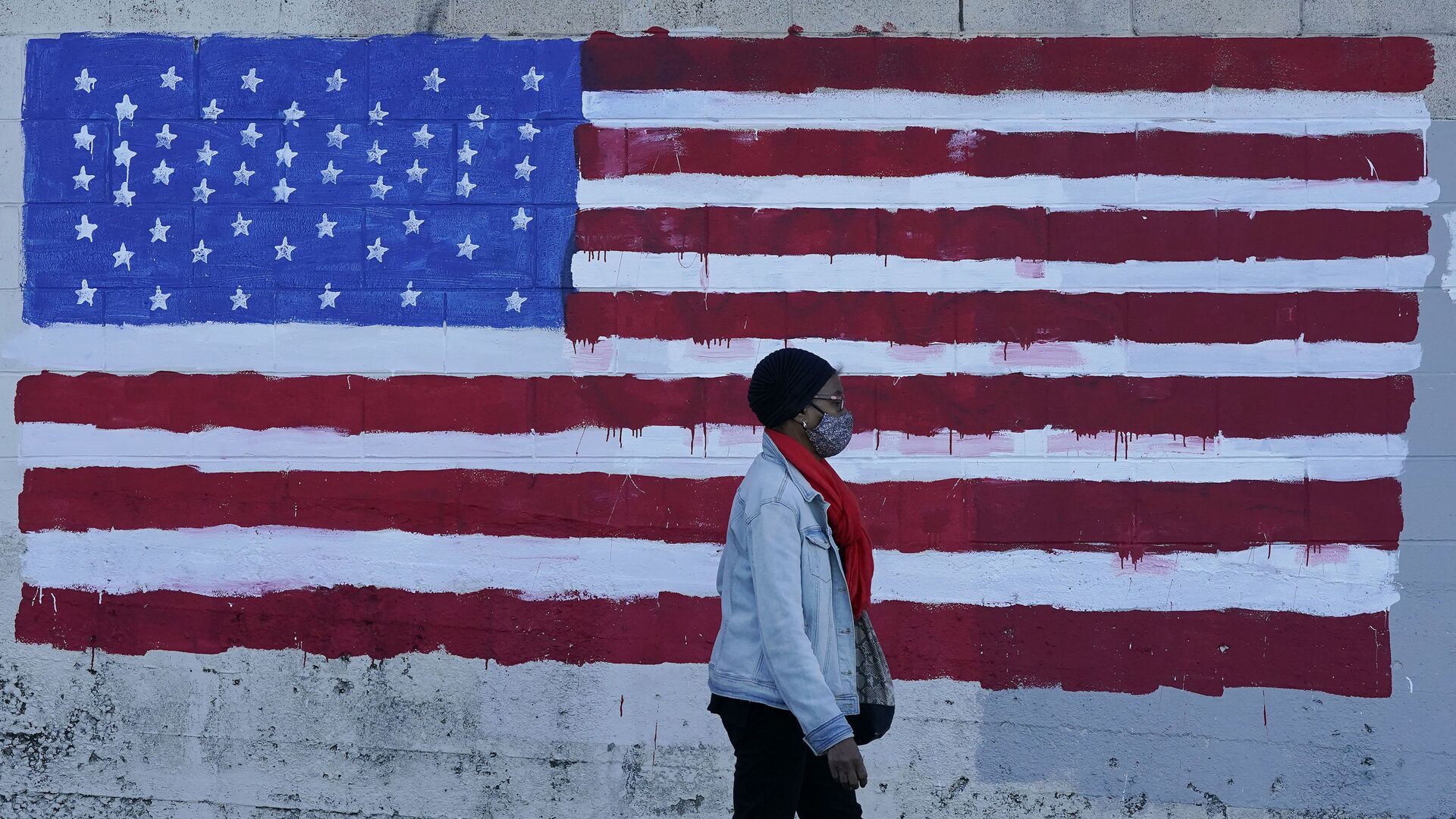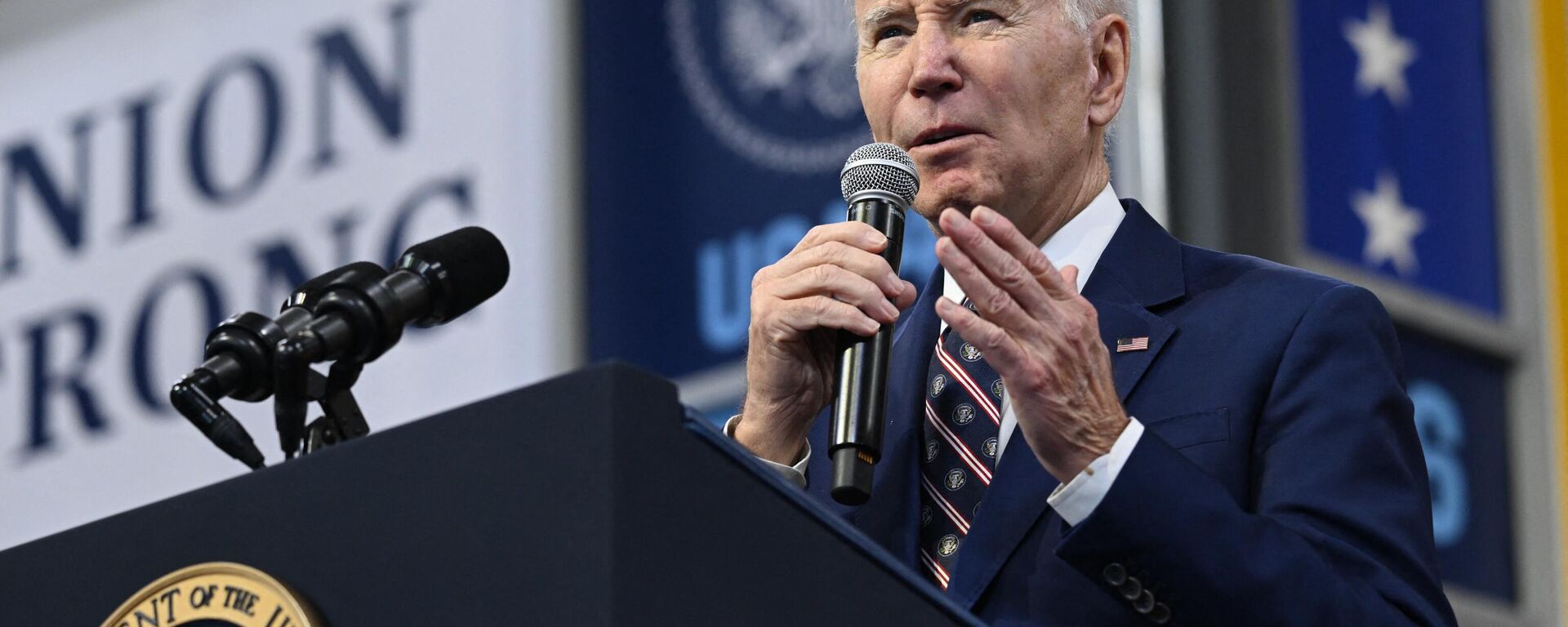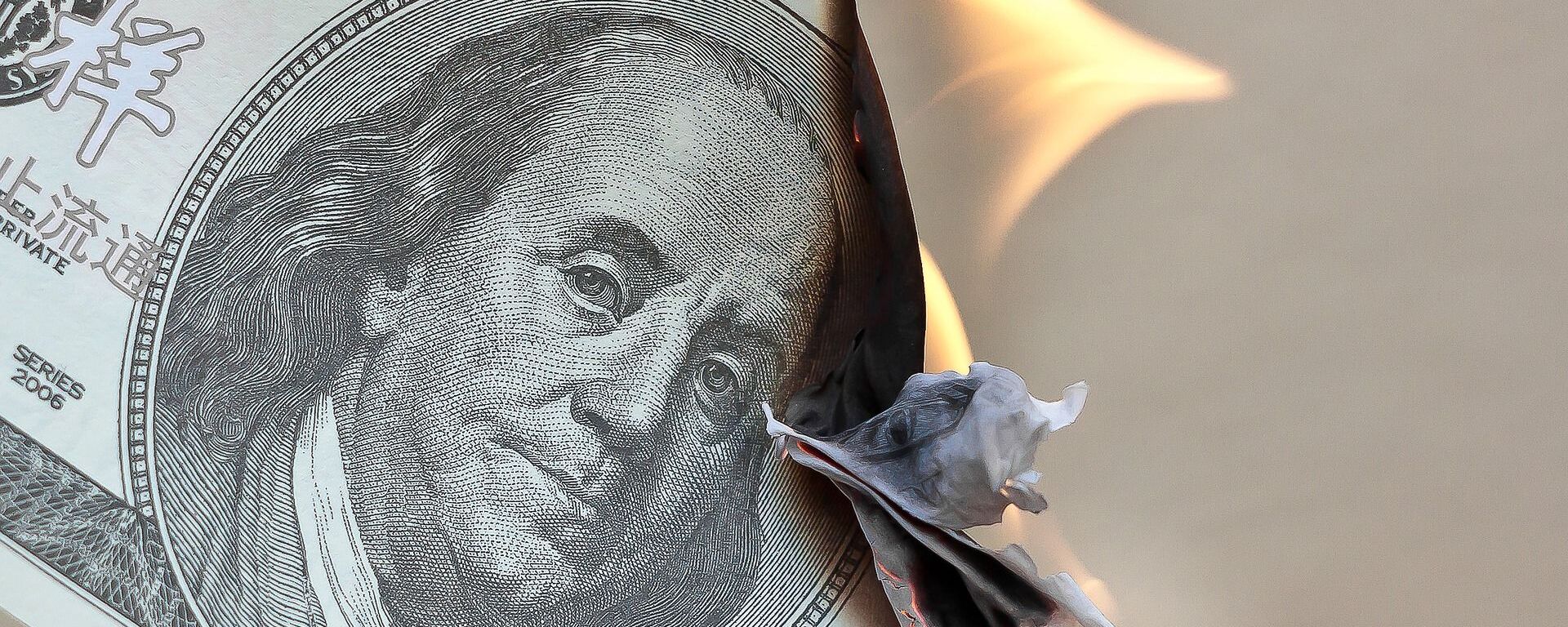https://sputnikglobe.com/20230328/polls-show-erosion-of-core-american-values-growing-anti-democratic-sentiment-in-us-1108878648.html
Polls Show Erosion of Core American Values, Growing Anti-Democratic Sentiment in US
Polls Show Erosion of Core American Values, Growing Anti-Democratic Sentiment in US
Sputnik International
A new Wall Street Journal-NORC poll has found that traditional US values, including patriotism, religious faith, having children, and tolerance towards others... 28.03.2023, Sputnik International
2023-03-28T17:29+0000
2023-03-28T17:29+0000
2023-03-28T17:29+0000
americas
us
poll
norc center for public affairs research
joe biden
recession
inflation
democracy
values
us economy
https://cdn1.img.sputnikglobe.com/img/07e5/03/02/1082238164_0:160:3073:1888_1920x0_80_0_0_e521b09adf64de260b3b168e64d39328.jpg
NORC at the University of Chicago, one of the largest US independent social research organizations, has conducted a survey which exposed deep transformations and fears in American society.First and foremost, only 1% of American respondents said that the nation's economy these days is "excellent"; 20% said it's "good," while 54% defined it as "poor," and 26% said it's "not so good."When asked how the state of the economy will change, only 15% suggested that it will get better; 38% said that it will stay about the same; while a plurality (47%) predicted that it will get worse. Inflation still remains the major concern of those polled (65%).Likewise, 44% of US respondents don't believe they and their family have a good chance of improving their standards of life, with just 28% saying the opposite.Only 21% of Americans feel confident that life for their children’s generation will be better than it was for them, while 78% aren't confident about that.When it comes to values that helped define the US national character for generations, one could notice a steep decline in comparison with a similar 1998 survey. Thus, the number of those saying that patriotism is very important has slid from 70% to 38%; only 39% believe that religion is very important, sliding from 62%; those who say that having children is important dropped from 59% to 30%. The importance of community involvement has also shrunk from 47% to 27%. At the same time, tolerance towards others, defined as very important by 80% of Americans just four years ago, has fallen to 58%. Pollsters, cited by the US press, suggest that the combination of political division, COVID, and the lowest economic confidence in decades seems to be having a profound effect on American core values.Meanwhile, another disturbing trend that shed some light on the changing mindset of the American people was spotted last September. A poll conducted by Axios-Ipsos Two Americas Index showed that around one in three Americans would prefer a strong unelected leader to a weak elected one, and believe that US presidents should be able to oust judges over their decisions.The pollster underscored that Republicans and Democrats supported non-democratic norms in about equal percentages. What's more, Democratic respondents (42%) were more eager than the GOP (29%) to grant presidents the power to remove judges when their decisions go against the national interests.The September 2022 survey also found that many Americans (38%) agree that the US government should follow the will of the majority, even at the expense of the civil rights of ethnic and religious minorities.Around a third – 34% among both Republicans and Democrats – said that the federal government should be able to prosecute journalists and news media for offensive or unpatriotic statements.Commenting on the poll's results, some US academics alleged that there's a lot of anti-democratic sentiment in the country – a lot more than one might have expected.
https://sputnikglobe.com/20230328/only-40-of-americans-approve-bidens-work-poll-shows-1108870644.html
https://sputnikglobe.com/20230323/us-faces-multifaceted-crisis--overhaul-of-global-trade-and-economy-professor-1108724253.html
americas
Sputnik International
feedback@sputniknews.com
+74956456601
MIA „Rossiya Segodnya“
2023
News
en_EN
Sputnik International
feedback@sputniknews.com
+74956456601
MIA „Rossiya Segodnya“
Sputnik International
feedback@sputniknews.com
+74956456601
MIA „Rossiya Segodnya“
us polls, political divide in the us, partisan polarization in the us, us inflation, looming recession in the us, us core values, us traditional values, american dream, us democracy, us minorities, inflation major concern in the us, norc poll, ipsos two americas index
us polls, political divide in the us, partisan polarization in the us, us inflation, looming recession in the us, us core values, us traditional values, american dream, us democracy, us minorities, inflation major concern in the us, norc poll, ipsos two americas index
Polls Show Erosion of Core American Values, Growing Anti-Democratic Sentiment in US
A new Wall Street Journal-NORC poll has found that traditional US values, including patriotism, religious faith, having children, and tolerance towards others are gradually losing importance to Americans, with political divide growing and economic concerns on the rise.
NORC at the University of Chicago, one of the largest US independent social research organizations, has conducted a
survey which exposed deep transformations and fears in American society.
First and foremost, only 1% of American respondents said that the nation's economy these days is "excellent"; 20% said it's "good," while 54% defined it as "poor," and 26% said it's "not so good."
When asked how the state of the economy will change, only 15% suggested that it will get better; 38% said that it will stay about the same; while a plurality (47%)
predicted that it will get worse. Inflation still remains the major concern of those polled (65%).
Likewise, 44% of US respondents don't believe they and their family have a good chance of improving their standards of life, with just 28% saying the opposite.
Only 21% of Americans feel confident that life for their children’s generation will be better than it was for them, while 78% aren't confident about that.
When it comes to values that helped define the US national character for generations, one could notice a steep decline in comparison with a similar 1998 survey. Thus, the number of those saying that patriotism is very important has slid from 70% to 38%; only 39% believe that religion is very important, sliding from 62%; those who say that having children is important dropped from 59% to 30%. The importance of community involvement has also shrunk from 47% to 27%. At the same time, tolerance towards others, defined as very important by 80% of Americans just four years ago, has fallen to 58%.
Pollsters, cited by the US press, suggest that the combination of political division, COVID, and the lowest economic confidence in decades seems to be having
a profound effect on American core values.
Meanwhile, another disturbing trend that shed some light on the changing mindset of the American people was spotted last September. A
poll conducted by Axios-Ipsos Two Americas Index showed that around one in three Americans would prefer a strong unelected leader to a weak elected one, and believe that US presidents should be able to oust judges over their decisions.
The pollster underscored that Republicans and Democrats supported non-democratic norms in about equal percentages. What's more, Democratic respondents (42%) were more eager than the GOP (29%) to grant presidents the power to remove judges when their decisions go against the national interests.
The September 2022 survey also found that many Americans (38%) agree that the US government should follow the will of the majority, even at the expense of the civil rights of ethnic and religious minorities.
Around a third – 34% among both Republicans and Democrats – said that the federal government should be able to prosecute journalists and news media for offensive or unpatriotic statements.
Commenting on the poll's results, some US academics alleged that there's a lot of anti-democratic sentiment in the country – a lot more than one might have expected.




